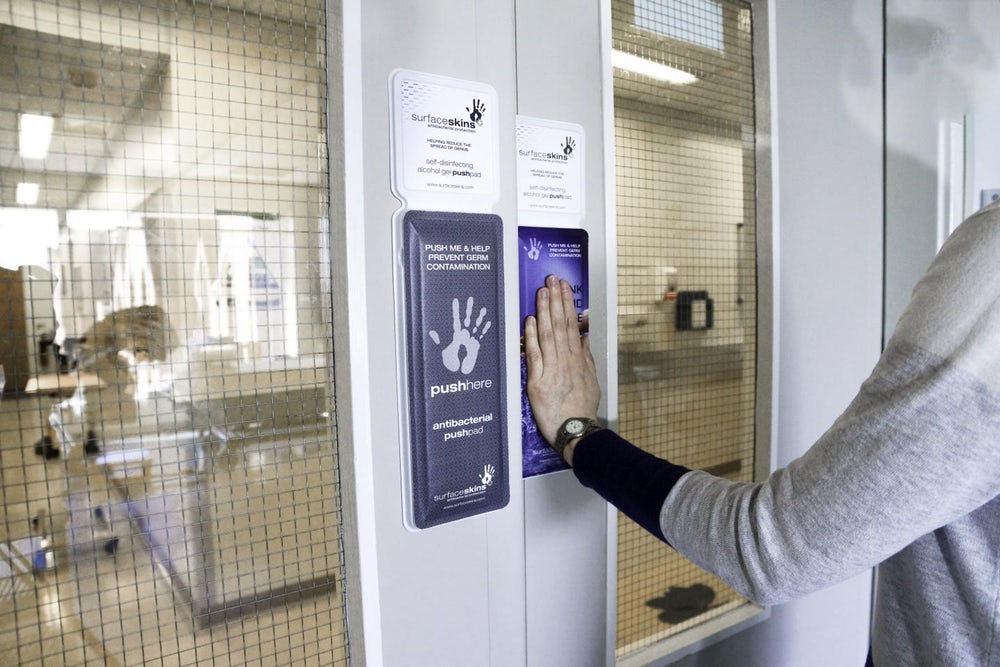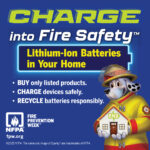 Joe Prosser of LaForce, Inc., sent me a link to an article about a product called Surfaceskins, which is a “push-pad” (pulls are also available) that releases a small amount of antibacterial gel when touched. I know that the transmission of bacteria is a huge problem – especially for health care facilities, and the door and hardware industry has been working on various solutions like anti-microbial coatings and base materials that kill germs.
Joe Prosser of LaForce, Inc., sent me a link to an article about a product called Surfaceskins, which is a “push-pad” (pulls are also available) that releases a small amount of antibacterial gel when touched. I know that the transmission of bacteria is a huge problem – especially for health care facilities, and the door and hardware industry has been working on various solutions like anti-microbial coatings and base materials that kill germs.
Have any of you ever used a product like this? What are the pros and cons vs. other methods of controlling the spread of bacteria? I think it’s an interesting idea, but will people actually touch the pad once they know that gel will be released? Will facility personnel replace the pads weekly, as recommended?
Note: I am not affiliated with this company or product. I’m just interested in your (constructive) feedback.
Photo: University of Leeds
You need to login or register to bookmark/favorite this content.





It looks like a good idea but some concerns that I have is that the pad holder looks like it is made of plastic. Which I feel won’t hold up to the long term wear and tear that a hospital would need.
Both CDC and WHO identify hands as one of the primary sources of infectious disease transmission so at first blush, it would appear these will help stop that transmission. Two concerns: 1) in some facilities there could be hundreds, if not thousands of these. Keeping them stocked and changed could prove challenging, 2) Chlostridium Difficile (c diff), one of the more serious bacterial infections is unaffected by alcohol, so these pads won’t stop the transmission.
Jumping to their web pages and they keep saying ‘anti-bacterial’ but never mention fungus or virus transmission. Also, I suspect users will not use them depending on the feel of this small amount of alcohol dispensed. I could imagine the section of door beside the plate often being the area where users push.
The video says the pads are replaced weekly and yet seem under 1 cm or 3/8″ thick. Could the alcohol mixture really last a week in a very high use door? I would like to see independent lab test results.
Imagine you saw the “Fire Door Keep Closed” stickers on the one pair in the vid. UK compliant.
“forces alcohol gel out of a reservoir within the pad” dripping on floors (slipping hazard), door finish. Sometimes just doing the basic job may be the best way. I can not see this in a public area.
Personally, the idea of putting my hand on a wet pad that everyone else has used doesn’t make me feel any cleaner. I would still just use my foot or elbow to push open the door. My bigger issue is an in-swing door, where you don’t have the boot option. Never an advocate of more codes, but seems like out-swing doors would be a good idea for all bathrooms if the spread of germs and viruses are the concern. Besides, I am not interested in giving folks another reason to not wash there hands.
Very interesting..never heard of this before .
Say your there for a only day maybe its not to bad but if you work there and have to push those pads all the time I’m not sure how I would feel about that.
Depending on the flow of people they may be a worse idea then nothing at all.
Some healthcare facilities are trying to force employees to take flu shots this is kinda down that same road.
I like the touch less approach… we are starting to see this in some restrooms.
As the FDA has noted, antibacterial products are no more effective than soap and water and have the potential to create antibiotic-resistant bacteria, see article of January 3, 2014 from Smithsonian.com at the link:
https://www.smithsonianmag.com/science-nature/five-reasons-why-you-should-probably-stop-using-antibacterial-soap-180948078/
I too was wondering about re-filling these products and/or are they single use and you replace the whole pad. What if they get clogged? I don’t know. The concept is a good idea I think.
These wouldn’t last one day in the hospital I worked in.
Cardiac monitor carts, linen carts, supply carts, housekeeping carts, even IV poles would damage them, or just tear them right off.
I’m wary, myself. The pathogens that are exposed but not killed are left to multiply, with successive generations becoming increasingly impervious to whatever chemical is used. We’ll then have a facility full of “super germs”. I’m liking copper alloy touch surfaces for now.
The medical community has been concerned by, and has been studying, the rise of superbugs over the last several years. One of the contributing factors has been the overuse of antibiotics. I realize this is an oversimplification of a complex problem but the old phrase “only the strong survive” comes to mind. These types of products help in the short term but what about long term? If they are used, the more “invisible” these products are the better. You never want a health care employee thinking they are a substitute for correct hygiene protocols.
In use areas such as this most hospitals already use a variety of automatic doors so staff can avoid touching anything. Most anti-bacterial products, like soaps, have contributed to bacteria that are ever more resistant which is why many anti-bacterial products are coming off the market. Beyond some of the earlier comments I can see other issues like: staff who are in a hurry responding to a code and miss the pad or only hit part of it, how many different mounting heights will be necessary to comply with ADA and/or serve needs of small children, etc. Seems like a costly, high maintenance item that most environmental or maintenance departments would be loath to embrace this concept. For surfaces that must be touched we already have silver and copper finishes that are naturally anti-bacterial.
Cool idea, but my concern is that the gel would… congeal and get sticky/clogged due to poor maintenance. Additionally, I would fear that doctors/nurses would not feel the need to wash hands as frequently because they got hand sanitizer via the door already. Not something that would make me feel better as an informed patient.
A number of questions come to my mind….
– How might this impact any fire ratings?
– What about people who may be allergic to the solution?
– Are end users inclined to put something on a door that needs to be changed every 7 days? Think of the number of openings in a hospital….full time jobs for lots of folks I guess.
Interesting idea, however, not very practical IMO.
Nice post! Thanks for sharing
great Articles